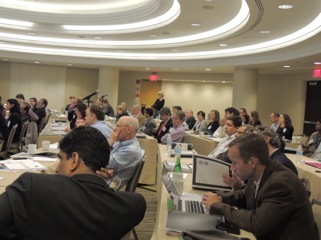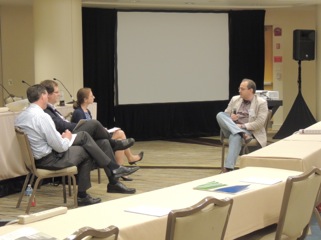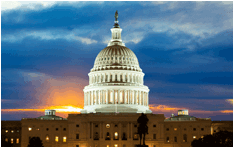Computing Research News
August 2013 Vol.25 / No.7
Computing Researchers Get ‘Schooled’ on Science Policy at LiSPI 2013
By Peter Harsha, CRA Director of Government Affairs and Fred Schneider, Cornell University
As part of its mission to develop a next generation of leaders in the computing research community, the Computing Research Association’s Computing Community Consortium recently held its second Leadership in Science Policy Institute (LiSPI). This one and a half-day workshop was intended to educate a cadre of computing researchers on how science policy in the U.S. is formulated and how our government works. Participants heard candid and “off the record” views from people who do it or have done it. Fifty-three computer scientists and engineers from forty-eight different universities and research organizations attended the April 11-12th workshop.
The workshop built on the success of CRA’s first CCC LiSPI in November 2011, and in response to the very positive feedback from LiSPI 2011 participants, added a half-day to the workshop to allow more time for discussions and the addition of two new panels, as well as increased the number of participants (up from 34 in 2011).
 The workshop offered sessions on: interacting with Federal science agencies, how new initiatives are created within agencies, the role of Federal advisory committees, the Federal budget process, embedding scientists in non-science agencies, the arguments for supporting research in computing, how to talk to policymakers, and a rather candid discussion from two staffers on the House Science, Space and Technology committee. LiSPI participants were required to complete both pre- and post-workshop homework assignments.
The workshop offered sessions on: interacting with Federal science agencies, how new initiatives are created within agencies, the role of Federal advisory committees, the Federal budget process, embedding scientists in non-science agencies, the arguments for supporting research in computing, how to talk to policymakers, and a rather candid discussion from two staffers on the House Science, Space and Technology committee. LiSPI participants were required to complete both pre- and post-workshop homework assignments.
LiSPI co-organizer Fred Schneider started the day by laying out goals of the workshop and workshop co-organizer Peter Harsha followed by laying out the “case” for computing research investments in Washington. Participants then heard from representatives of three key science agencies: Jeannette Wing, former Assistant Director for Computer and Information Science and Engineering at the National Science Foundation, Milton Corn, from the National Institutes of Health; and Howard Shrobe, from the Defense Advanced Research Projects Agency. This panel explained that influencing policy decisions at a Federal agency involves a somewhat different skill set and somewhat different approach than influencing faculty peers, the Congress, or the White House. The panelists also discussed how agencies provide opportunities for researchers to shape federal policy in their fields---by serving on advisory committees and by taking rotations as program managers, division directors or office directors. The three panelists also discussed how new agency initiatives get started, focusing on the culture and traditions that create the lens through which agencies view themselves and are viewed by others.
In the next session, Edward Lazowksa, Chair of CCC, Annie Antón, from Georgia Tech, and Kevin Fu, from the University of Michigan, described the role and dynamics of advisory committees that are found at nearly every level of the Federal government. The speakers discussed how those committees work (in theory and practice), why they sometimes do not work, how members are chosen, and who they are intended to influence (as well as who they actually influence). All three panelists have served on a variety of Federal advisory committees, so these speakers were particularly well qualified to discuss how issues get raised and vetted, how outcomes get finalized and disseminated, how committees do their jobs, and how members of the community can be effective when serving on these committees.
 LiSPI participants then heard a primer on the Federal budget process by R&D budget “guru” (and Assistant Director for Federal Research and Development for the White House’s Office of Science and Technology Policy) Kei Koizumi. Koizumi walked the audience through the mechanics of the Federal budget process, including key milestones and inflection points in the process. He also explained impacts of the budget sequestration and the new budget environment on Federal science budgets in the future.
LiSPI participants then heard a primer on the Federal budget process by R&D budget “guru” (and Assistant Director for Federal Research and Development for the White House’s Office of Science and Technology Policy) Kei Koizumi. Koizumi walked the audience through the mechanics of the Federal budget process, including key milestones and inflection points in the process. He also explained impacts of the budget sequestration and the new budget environment on Federal science budgets in the future.
Practical advice on “Having the Conversation” with policymakers was offered by a former congressional staffer and current member of the Microsoft Technology Policy Group, Elizabeth Grossman. Grossman described how policymakers approach meetings with researchers and how researchers might be best prepared to provide useful input. Grossman also charged the attendees with coming up with a pitch – a 3-5 minute introduction to a hypothetical policymaker or answering a tough question a policymaker might pose – honing it as “homework” during the first night of the workshop and then presenting it to a “murderer board” of public policy professionals (Grossman, Cameron Wilson of ACM, and Harsha of CRA – all former congressional committee professional staff) for constructive advice on the second day of the workshop. This practicum session was perhaps the best liked of the workshop, as participants got a good sense of how a conversation might go, and how it could be most productive.
Ending the first day’s sessions, current congressional staff members Julia Warner, from the House Science, Space and Technology committee majority, and Dahlia Sokolov, from the committee’s minority staff, took to the podium to describe the unique difficulties of communicating the value of research to our elected officials and the difficulties of prioritizing science investments in the current political and fiscal climate. Both Warner and Sokolov spoke candidly about challenges they face in an increasingly polarized Congress, noting that the Science committee is not immune from the increasing partisanship.
 In addition to the practicum session, day two of the workshop featured a panel of current and former chief technology officers at the Federal Communications Commission and Federal Trade Commission, as well a current White House Office of Science and Technology Policy detailee talking about the importance of finding scientists from the computing research community to serve Federal non-science agencies. Steve Bellovin, current CTO at FTC, Henning Schulzrinne, current CTO at FCC, Ed Felten, former CTO at FTC, and Vijay Kumar, currently at OSTP, all spoke about their experiences incorporating technical expertise in regulatory agencies and the White House, and how important it is that these non-science mission-orientated agencies establish a good connection to the research community.
In addition to the practicum session, day two of the workshop featured a panel of current and former chief technology officers at the Federal Communications Commission and Federal Trade Commission, as well a current White House Office of Science and Technology Policy detailee talking about the importance of finding scientists from the computing research community to serve Federal non-science agencies. Steve Bellovin, current CTO at FTC, Henning Schulzrinne, current CTO at FCC, Ed Felten, former CTO at FTC, and Vijay Kumar, currently at OSTP, all spoke about their experiences incorporating technical expertise in regulatory agencies and the White House, and how important it is that these non-science mission-orientated agencies establish a good connection to the research community.
Schneider wrapped-up the workshop with a session about serving as a witness at a congressional hearing. He played video-taped highlights from a recent hearing on the Federal Networking and Information Technology R&D (NITRD) program. To start, participants viewed the opening five-minute statements from CCC’s Lazowska and Bob Sproull (formerly director of research at of Oracle Labs)---each presenting a “case for funding computing research”. Schneider then played two questions put to the hearing witnesses by Members of Congress during the hearing. Chairman Mo Brooks (R-AL) asked how to justify increased NITRD funding given today’s budget climate, and Rep. Roscoe Bartlett (R-MD) asked how to justify increased IT investment given its small effect on balance of trade. Participants were asked to craft 30 second answers to both questions as their “final exam” for the day.
The feedback from all of the participants was quite positive. Slides from the speakers are posted on the web (http://www.cra.org/ccc/leadership/leadership-in-science-policy-institute) for CRN readers thirsting for details about what was presented. Moreover, chances are quite good that CRA will seek to put on similar programs in the future, since there in acute need to develop a community of computer scientists who can participate in science policy, If you would like to be considered for participation in those programs, keep an eye on the Computing Research Policy Blog (http://cra.org/blog) and the CCC Blog (http://cccblog.org) for the next announcement.
1828 L STREET, NW SUITE 800, WASHINGTON, DC 20036 | P: 202-234-2111 | F: 202-667-1066




